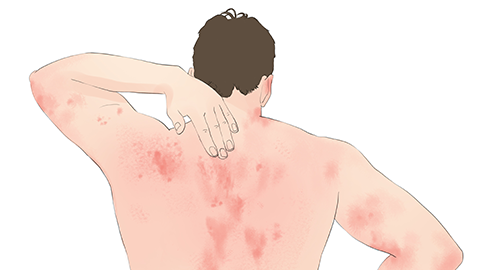What causes the skin to become itchier the more you scratch it?
Generally, the main reasons why scratching makes skin itchier include dry skin, mechanical irritation, eczema, urticaria, and neurodermatitis. If discomfort occurs, it is recommended to seek timely medical evaluation and treatment at a reputable hospital. Specific explanations are as follows:
1. Dry Skin
Dry skin lacks moisture, leading to weakened barrier function and increased sensitivity of nerve endings. Scratching further damages the skin barrier and worsens itching. It is advisable to bathe daily with lukewarm water, avoid excessive cleansing, and apply moisturizers such as vitamin E cream, urea cream, or petroleum jelly immediately after bathing to maintain skin hydration.

2. Mechanical Irritation
Physical friction from scratching raises local skin temperature and triggers the release of inflammatory mediators such as histamine, intensifying the sensation of itchiness and creating a "scratch-itch-worsen" cycle. Avoid scratching; instead, apply a cold compress or ice pack gently to the affected area to lower the local temperature, relieve discomfort, and reduce the release of inflammatory substances.
3. Eczema
Eczema is caused by various internal and external factors that trigger skin inflammation. Damage to epidermal cells exposes nerves, and scratching spreads inflammation and increases itching. Under medical guidance, topical corticosteroids such as hydrocortisone butyrate cream or mometasone furoate gel may be used, along with oral antihistamines like ebastine tablets. Avoid allergens and wear loose-fitting cotton clothing.
4. Urticaria (Hives)
After exposure to allergens, the immune system releases histamine, causing blood vessels in the skin to dilate and become more permeable, resulting in hives and intense itching. Scratching stimulates further histamine release. Under medical supervision, medications such as levocetirizine hydrochloride tablets, chlorpheniramine maleate tablets, or olapatadine hydrochloride tablets can be taken. Identify and avoid allergens such as pollen, seafood, etc.
5. Neurodermatitis
Neurodermatitis is often triggered by prolonged stress, anxiety, or other factors causing nervous system dysfunction, leading to lichenification (thickened, leathery skin). Scratching exacerbates skin thickening and intensifies itching. Under medical guidance, halometasone cream or compound flumetasone ointment may be applied topically, and oryzanol tablets taken orally. Maintain emotional stability and avoid excessive scratching or rubbing of affected areas.
In daily life, keep the skin clean and well-moisturized; avoid frequent bathing and using irritating skincare products. Wear loose, breathable cotton clothing to minimize skin friction. Maintain a light diet and avoid spicy or irritating foods. Stay emotionally balanced and avoid stress and anxiety. Perform regular skin check-ups to detect and treat skin conditions early.






